An input/output device, often known as an IO device, is any hardware that allows a human operator or other systems to interface with a computer. Input/output devices, as the name implies, are capable of delivering data (output) to and receiving data from a computer (input). An input/output (I/O) device is a piece of hardware that can take, output, or process data. It receives data as input and provides it to a computer, as well as sends computer data to storage media as a storage output.
Input Devices
Input devices are the devices that are used to send signals to the computer for performing tasks. The receiver at the end is the CPU (Central Processing Unit), which works to send signals to the output devices. Some of the classifications of Input devices are:
- Keyboard Devices
- Pointing Devices
- Composite Devices
- Game Controller
- Visual Devices
- Audio Input Devices
Some of the input devices are described below.
Keyboard
The keyboard is the most frequent and widely used input device for entering data into a computer. Although there are some additional keys for performing other operations, the keyboard layout is similar to that of a typical typewriter.
Generally, keyboards come in two sizes: 84 keys or 101/102 keys but currently keyboards with 104 keys or 108 keys are also available for Windows and the Internet.

Keyboard
Types of Keys
- Numeric Keys: It is used to enter numeric data or move the cursor. It usually consists of a set of 17 keys.
- Typing Keys: The letter keys (A-Z) and number keys (09) are among these keys.
- Control Keys: These keys control the pointer and the screen. There are four directional arrow keys on it. Home, End, Insert, Alternate(Alt), Delete, Control(Ctrl), etc., and Escape are all control keys (Esc).
- Special Keys: Enter, Shift, Caps Lock, NumLk, Tab, etc., and Print Screen are among the special function keys on the keyboard.
- Function Keys: The 12 keys from F1 to F12 are on the topmost row of the keyboard.
Mouse
The most common pointing device is the mouse. The mouse is used to move a little cursor across the screen while clicking and dragging. The cursor will stop if you let go of the mouse. The computer is dependent on you to move the mouse; it won’t move by itself. As a result, it’s an input device.
A mouse is an input device that lets you move the mouse on a flat surface to control the coordinates and movement of the on-screen cursor/pointer.
The left mouse button can be used to select or move items, while the right mouse button when clicked displays extra menus.
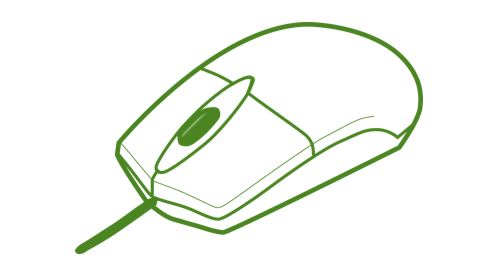
Mouse
Joystick
A joystick is a pointing device that is used to move the cursor on a computer screen. A spherical ball is attached to both the bottom and top ends of the stick. In a socket, the lower spherical ball slides. You can move the joystick in all four directions.
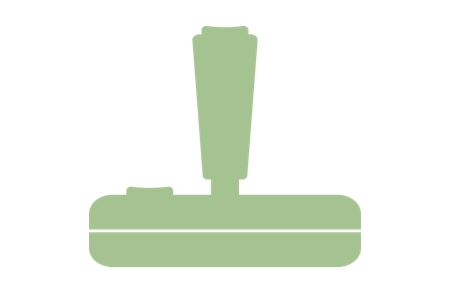
Joystick
The joystick’s function is comparable to that of a mouse. It is primarily used in CAD (Computer-Aided Design) and playing video games on the computer.
Track Ball
Track Ball is an accessory for notebooks and laptops, which works on behalf of a mouse. It has a similar structure to a mouse. Its structure is like a half-inserted ball and we use fingers for cursor movement. Different shapes are used for this like balls, buttons, or squares.
Light Pen
A light pen is a type of pointing device that looks like a pen. It can be used to select a menu item or to draw on the monitor screen. A photocell and an optical system are enclosed in a tiny tube. When the tip of a light pen is moved across a monitor screen while the pen button is pushed, the photocell sensor element identifies the screen location and provides a signal to the CPU.
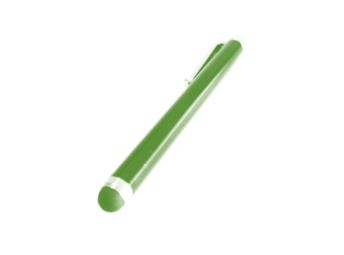
Light Pen
Scanner
A scanner is an input device that functions similarly to a photocopier. It’s employed when there’s information on paper that needs to be transferred to the computer’s hard disc for subsequent manipulation. The scanner collects images from the source and converts them to a digital format that may be saved on a disc. Before they are printed, these images can be modified.
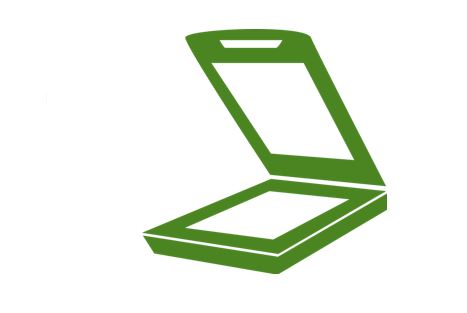
Scanner
Optical Mark Reader (OMR)
An Optical Mark Reader is a device that is generally used in educational institutions to check the answers to objective exams. It recognizes the marks present by pencil and pen.
Optical Character Reader (OCR)
OCR stands for optical character recognition, and it is a device that reads printed text. OCR optically scans the text, character by character turns it into a machine-readable code, and saves it to the system memory.
Magnetic Ink Card Reader (MICR)
It is a device that is generally used in banks to deal with the cheques given to the bank by the customer. It helps in reading the magnetic ink present in the code number and cheque number. This process is very fast compared to any other process.
Bar Code Reader
A bar code reader is a device that reads data that is bar-coded (data that is represented by light and dark lines).Bar-coded data is commonly used to mark things, number books, and so on. It could be a handheld scanner or part of a stationary scanner. A bar code reader scans a bar code image, converts it to an alphanumeric value, and then sends it to the computer to which it is connected.
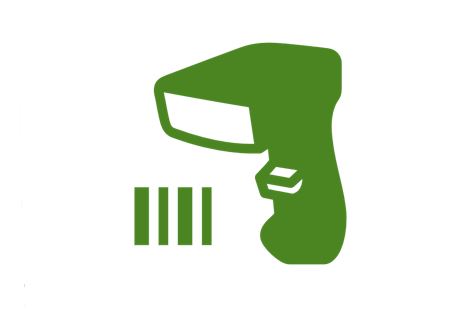
Bar Code Reader
Web Camera
Because a web camera records a video image of the scene in front of it, a webcam is an input device. It is either built inside the computer (for example, a laptop) or attached through a USB connection. A webcam is a computer-connected tiny digital video camera. It’s also known as a web camera because it can take images and record video. These cameras come with software that must be installed on the computer in order to broadcast video in real-time over the Internet. It can shoot images and HD videos, however, the video quality isn’t as good as other cameras (In Mobiles or other devices or normal cameras).
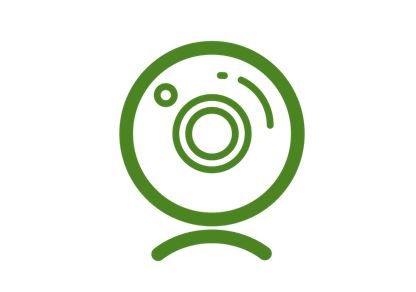
Web Camera
Digitizer
Digitizer is a device that is used to convert analog signals to digital signals. it converts signals into numeric values. An example of a Digitizer is Graphic Tablet, which is used to convert graphics to binary data.
Microphone
The microphone works as an input device that receives input voice signals and also has the responsibility of converting it also to digital form. It is a very common device that is present in every device which is related to music.
Output Devices
Output Devices are the devices that show us the result after giving the input to a computer system. Output can be of many different forms like image, graphic audio, video, etc. Some of the output devices are described below.
Monitor
Monitors, also known as Visual Display Units (VDUs), are a computer’s primary output device. It creates images by arranging small dots, known as pixels, in a rectangular pattern. The amount of pixels determines the image’s sharpness.
The two kinds of viewing screens used for monitors are described below.
- Cathode-Ray Tube (CRT) Monitor: Pixels are minuscule visual elements that make up a CRT display. The higher the image quality or resolution, the smaller the pixels.
- Flat-Panel Display Monitor: In comparison to the CRT, a flat-panel display is a type of video display with less volume, weight, and power consumption. They can be hung on the wall or worn on the wrist.
Flat-panel displays are currently used in calculators, video games, monitors, laptop computers, and graphical displays.
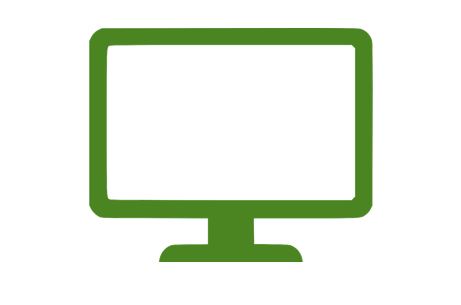
Monitor
Television
Television is one of the common output devices which is present in each and every house. It portrays video and audio files on the screen as the user handles the television. Nowadays, we are using plasma displays as compared to CRT screens which we used earlier.
Printer
Printers are output devices that allow you to print information on paper. There are certain types of printers which are described below.
- Impact Printers
- Character Printers
- Line Printers
- Non-Impact Printers
- Laser Printers
- Inkjet Printers
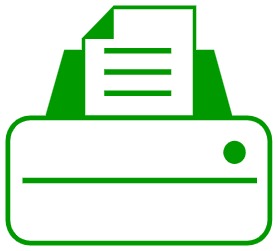
Printer
Impact Printer
Characters are printed on the ribbon, which is subsequently crushed against the paper, in impact printers. The following are the characteristics of impact printers:
- Exceptionally low consumable cost.
- Quite noisy
- Because of its low cost, it is ideal for large-scale printing.
- To create an image, there is physical contact with the paper.
Character Printers
Character Printer has the capability to print only one character at a time. It is of two types.
- Dot Matrix Printer
- Daisy Wheel
Line Printers
Line Printers are printers that have the capability to print one line at a time. It is of two types.
- Drum Printer
- Chain Printer
Non-Impact Printers
Characters are printed without the need for a ribbon in non-impact printers. Because these printers print a full page at a time, they’re also known as Page Printers. The following are the characteristics of non-impact printers:
- Faster
- They don’t make a lot of noise.
- Excellent quality
- Supports a variety of typefaces and character sizes
Laser Printers
Laser Printers use laser lights for producing dots which will produce characters on the page.
Inkjet Printers
Inkjet printers are printers that use spray technology for printing papers. High-quality papers are produced in an Inkjet printer. They also do color printing.
Speakers
Speakers are devices that produce sound after getting a command from a computer. Nowadays, speakers come with wireless technology also like Bluetooth speakers.
Projector
Projectors are optical devices that have the work to show visuals on both types of screens, stationary and moving both. It helps in displaying images on a big screen. Projectors are generally used in theatres, auditoriums, etc.
Plotter
Plotter is a device that helps in making graphics or other images to give a real view. A graphic card is mandatorily required to use these devices. These are the pen-like devices that help in generating exact designs on the computer.
Braille Reader
Braille Reader is a very important device that is used by blind users. It helps people with low vision or no vision to recognize the data by running their fingers over the device to understand easily. It is a very important device for blind persons as it gives them the comfort to understand the letters, alphabets, etc which helps them in study.
Video Card
A video Card is a device that is fitted into the motherboard of the computer. It helps in improvising digital content in output devices. It is an important tool that helps people in using multiple devices.
Global Positioning System (GPS)
Global Positioning System helps the user in terms of directions, as it uses satellite technology to track the geometrical locations of the users. With continuous latitudinal and longitudinal calculations, GPS gives accurate results. Nowadays, all smart devices have inbuilt GPS.
Headphones
Headphones are just like a speaker, which is generally used by a single person or it is a single-person usable device and is not commonly used in large areas. These are also called headsets having a lower sound frequency.
The Input and Output Devices of a Computer
There are so many devices that contain the characteristics of both input and output. They can perform both operations as they receive data and provide results. Some of them are mentioned below.
USB Drive
USB Drive is one of the devices which perform both input and output operations as a USB Drive helps in receiving data from a device and sending it to other devices.
Modem
Modems are one of the important devices that helps in transmitting data using telephonic lines.
CD and DVD
CD and DVD are the most common device that helps in saving data from one computer in a particular format and send data to other devices which works as an input device to the computer.
Headset
The headset consists of a speaker and microphone where a speaker is an output device and a microphone works as an input device.
Facsimile
A facsimile is a fax machine that consists of a scanner and printer, where the scanner works as an input device and the printer works as an output device.
FAQs on Input and Output Devices
1. List the Disadvantages of CRT Monitor.
Answer:
Some of the disadvantages of CRT Monitor are :
- High power consumption
- Big back and take up a lot of desk space.
- Because it is less bright than an LCD, it is not ideal for excessively bright environments.
- They’re big, heavy, and clumsy.
2. Compare Input & Output Devices.
Answer:
| Data is accepted by the user of the device |
It shows the data after processing to the user |
| It accepts the user’s data and transmits it to the processor for saving in the secondary memory or processing. |
It receives the data from the processor and returns it to the user |
| More complex designing |
Less complex designing |
| These devices are used to accept the data |
These devices are used to display or show the data |
| Example: Keyboard, mouse, etc |
Example: Monitor, Printer, etc |
3. What are the types of flat-panel displays?
Answer:
There are 2 types of flat-panel displays, which are described below.
- Emissive Display: Devices that turn electrical energy into light are known as emissive displays. For example, LEDs, Plasma panels, thin film electroluminescent displays, etc.
- Non-Emissive Display: Optical effects are used in Non-Emissive displays to turn sunshine or light from another source into graphical patterns. LCDs are a good example (Liquid Crystal Devices).
4. Explain the output device: Plotter.
Answer:
A plotter is a device that prints graphics in a variety of color formats with high-quality images. It’s similar to a printer but with more advanced capabilities. Plotter allows us to create pictures, 3D postcards, advertising signs, charts, and various designs of the internal structure of building machines, as well as print large maps, architectural drawings, large-format printing, and create pictures, 3D postcards, advertising signs, charts, and various designs of the internal structure of building machines.
5. Compare Impact & Non-Impact Printers.
Answer:
| Slow Speed |
Fast Speed |
| Makes a lot of Noisy |
They are less Noisy |
| Cheap |
Costly |
| Poor quality as compared to non-impact printers |
Good quality printing |
| It works by hammering a set of metal pins or a character set into the paper |
Ink is deposited in several forms during printing |
Share your thoughts in the comments
Please Login to comment...